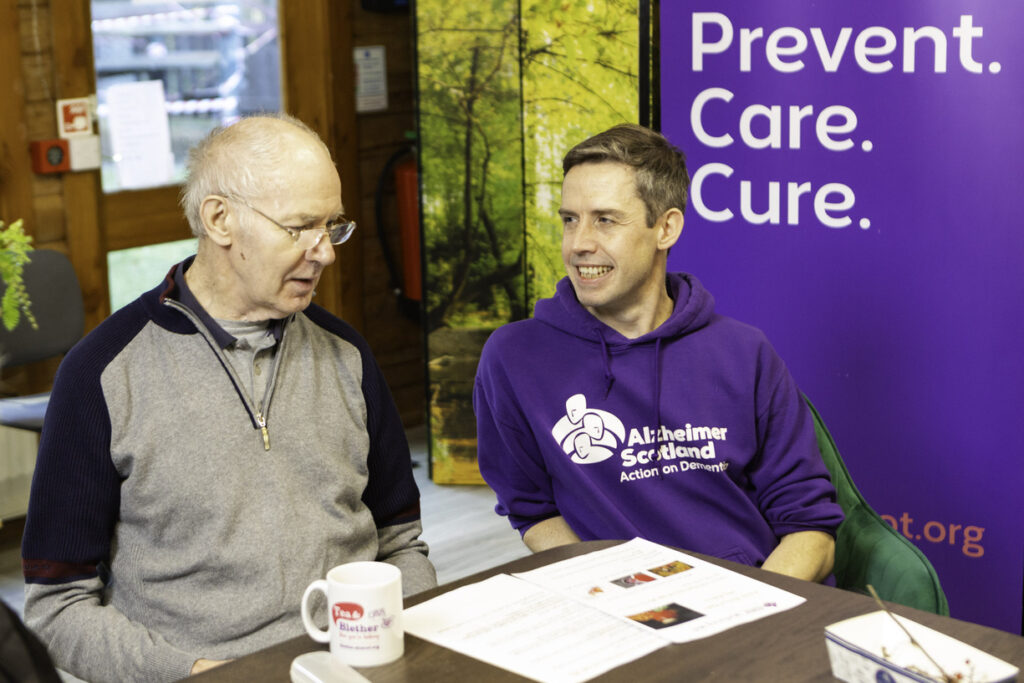Money and legal matters
Dementia can affect the memory and the ability make evaluate complicated situations. As the illness progresses this makes money and legal matters harder to manage.
Questions about money and legal matters
It’s important to put your financial and legal affairs in order as soon as possible. Making some decisions now can also help avoid complicated decisions being made by your partner, relatives or carer(s) at a later stage, without your input to the decision.
If you have questions such as:
- how can a financial or welfare power of attorney help?
- how can I access money in my relative’s account to pay their bills?
- what benefits can we apply for?
- what will happen to my house if I go into a care home?
- does my relative need a guardian?
you can find further information on the Office of the Public Guardian Scotland website or call them on 01324 678300. Our network of Dementia Advisors can also offer help with these issues.
Decisions about future treatment
If you have dementia, it is likely that you will gradually become less able to make decisions for yourself. This means that you could be given medical treatment that you would not normally want, or other decisions could be taken that go against what you would like. It can be difficult to plan for the future when you don’t know what the future holds. By setting out your preferences you can help people to understand how you wish to be treated.
The ways of planning for your future treatment are:
- making a general advance statement for your physical care and for most of your dementia care
- making an advance statement only concerning compulsory treatment for your dementia, if you need it in the future
- appointing someone else to take over from you when you are unable to make decisions yourself (granting a welfare power of attorney)
- choosing to make no plans.
Power of attorney
A power of attorney is a document in which you grant someone else the power to run your affairs for you if you become mentally incapacitated in the future for any reason, through an accident or illness (such as dementia).
There are two kinds of power of attorney which will help if you become mentally incapacitated:
- Continuing (financial) power of attorney – which allows someone to look after your money and property
- Welfare power of attorney – which allows someone to decide about your personal welfare, such as medical and care decisions.
You can make one power of attorney covering both welfare and money matters, or two powers, appointing different people. You can appoint joint attorneys or choose someone as a substitute attorney in case your first choice can’t carry on. Your attorney needs to be someone you trust, like a relative, friend or professional.
To set up your own power of attorney, see a solicitor.
You can learn more about power of attorney by downloading our information sheet below:
Free personal and nursing care
We’ve put together a brief guide on what personal care and nursing care means for people with dementia which covers:
- what is meant by personal care
- people in their own home
- people living in a care home.
Personal care includes help with:
- personal assistance – such as help with dressing, surgical appliances, getting up & going to bed, using a hoist
- personal hygiene – such as bathing, washing hair, shaving, oral hygiene and nail care
- continence management – such as toileting, catheter/stoma care, skin care, extra laundry or bed changing
- food and diet – such as help with eating, special diets, meal services or preparing specialist meals such as pureed food
- immobility and help with moving about indoors
- behaviour management and psychological support, including reminding and safety devices
- support with other treatments – such as help with eye drops, creams and lotions, simple dressings and oxygen therapy.
For more information to define the difference between personal and nursing care, along with what support you are entitled to, click the button below to download our guide to free personal and nursing care
